Best Movie |
 Capote 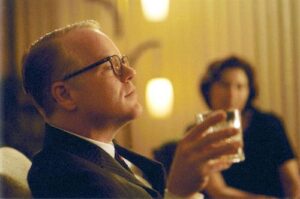 – A unique biography about a particularly unique biographer. Phillip Seymour Hoffman stars in this film, depicting the making of Truman Capote’s nonfiction work, In Cold Blood. The film has generated vast acclaim, largely due to P. S. Hoffman’s stellar performance, where he reveals a complex character suffering from a single-minded, self-absorbed mentality. The film portrays Capote as he explores the subject matter of his most popular book, such that filmgoers are able to view a detailed journey through the author’s moral mind. –ec – A unique biography about a particularly unique biographer. Phillip Seymour Hoffman stars in this film, depicting the making of Truman Capote’s nonfiction work, In Cold Blood. The film has generated vast acclaim, largely due to P. S. Hoffman’s stellar performance, where he reveals a complex character suffering from a single-minded, self-absorbed mentality. The film portrays Capote as he explores the subject matter of his most popular book, such that filmgoers are able to view a detailed journey through the author’s moral mind. –ec |
 2046 – Wong Kar-wai follows up on two of his other works (IN THE MOOD FOR LOVE and DAYS OF BEING WILD) by continuing to explore the lives and relationships of some of his characters. Granted, relationships and their themes were always at the forefront of these films, but 2046 throws a new twist into this exploration by having an undercurrent of science fiction ‘mythology’ throughout the film. The past, present, and future of these characters are all beautifully interwoven as a myriad of possibilities unfolds before the viewer. The acting is top-notch, the script traps the viewer into emotional entanglements with the characters, and the settings are beautifully rendered. Wong Kar-wai is able to show us the depths of emotion and the twists and turns a life takes as the totality of that life emerges through one’s actions through time. –clk 2046 – Wong Kar-wai follows up on two of his other works (IN THE MOOD FOR LOVE and DAYS OF BEING WILD) by continuing to explore the lives and relationships of some of his characters. Granted, relationships and their themes were always at the forefront of these films, but 2046 throws a new twist into this exploration by having an undercurrent of science fiction ‘mythology’ throughout the film. The past, present, and future of these characters are all beautifully interwoven as a myriad of possibilities unfolds before the viewer. The acting is top-notch, the script traps the viewer into emotional entanglements with the characters, and the settings are beautifully rendered. Wong Kar-wai is able to show us the depths of emotion and the twists and turns a life takes as the totality of that life emerges through one’s actions through time. –clk |
The Best of Youth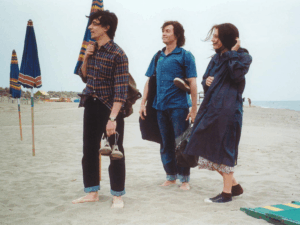 – Originally commissioned for (but never shown on) Italian television, Marco Tullia Giordana’s masterful six-hour film tracks nearly forty years of that country’s history, as experienced by the Carati family. When we first meet brothers Nicola (Luigi Lo Cascio) and Matteo (Alessio Boni) as two students in an idyllically-rendered Rome of 1966, we can’t imagine what radically divergent paths their lives will soon take. Set against an ever-changing backdrop of natural disasters, political upheaval and sociological change, this is a grand historical epic with the intimacy of a familial drama like THE GODFATHER. Well worth your time and dedication, you can’t help but feel swept away by its stirring narrative, sublime period soundtrack and resounding humaneness. –ck – Originally commissioned for (but never shown on) Italian television, Marco Tullia Giordana’s masterful six-hour film tracks nearly forty years of that country’s history, as experienced by the Carati family. When we first meet brothers Nicola (Luigi Lo Cascio) and Matteo (Alessio Boni) as two students in an idyllically-rendered Rome of 1966, we can’t imagine what radically divergent paths their lives will soon take. Set against an ever-changing backdrop of natural disasters, political upheaval and sociological change, this is a grand historical epic with the intimacy of a familial drama like THE GODFATHER. Well worth your time and dedication, you can’t help but feel swept away by its stirring narrative, sublime period soundtrack and resounding humaneness. –ck |
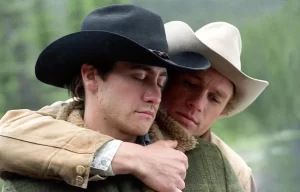 Brokeback Mountain – One of the most talked-about films of the past year, BROKEBACK MOUNTAIN is the story of the secret relationship between Ennis Del Mar (Heath Ledger) and Jack Twist (Jake Gyllenhall), two ranch hands who meet when working as sheepherders one summer. The film is a triumph for director Ang Lee, who brings a restrained approach to Larry McMurtry and Diana Ossana’s adaptation of Annie Proulx’s short story of unrequited love. As one might expect, the film begins with Ennis and Jack’s burgeoning relationship. Later, the audience is drawn into their marriages and the inevitable effect that their secret has on their lives and loved ones. From Rodrigo Prieto’s sweeping cinematography to Gustavo Santaolalla’s emotional score to the outstanding ensemble cast, the film succeeds at all levels. –gc Brokeback Mountain – One of the most talked-about films of the past year, BROKEBACK MOUNTAIN is the story of the secret relationship between Ennis Del Mar (Heath Ledger) and Jack Twist (Jake Gyllenhall), two ranch hands who meet when working as sheepherders one summer. The film is a triumph for director Ang Lee, who brings a restrained approach to Larry McMurtry and Diana Ossana’s adaptation of Annie Proulx’s short story of unrequited love. As one might expect, the film begins with Ennis and Jack’s burgeoning relationship. Later, the audience is drawn into their marriages and the inevitable effect that their secret has on their lives and loved ones. From Rodrigo Prieto’s sweeping cinematography to Gustavo Santaolalla’s emotional score to the outstanding ensemble cast, the film succeeds at all levels. –gc |
Me and You and Everyone We Know – “Warm: 3-D and Touch in the Digital Age” is the title of the art show being prepared in this year’s delightfully oddball comedy ME AND YOU AND EVERYONE WE KNOW, and the essential dilemma of the exhibition title mirrors the struggle of the films characters. Everyone we get to know in the film – from age six to seventy, from modest shoe salesman to successful museum curator – is looking for a way to share their astonishing experiences with someone else. Director/writer/actress Miranda July places the characters in astonishingly risky situations, but we are less concerned for their safety than their emotional well-being. The personal reaction to a harmless social faux pas becomes more important than a potential contact with a “killer of children.” And in the end, it’s the mundane that becomes magical and the distance that draws us closer than we’ve ever been before. Who would ever think that a curious blend of shopping, deviant sex, performance art, and emoticons would lead us out of our existential angst? –sc – “Warm: 3-D and Touch in the Digital Age” is the title of the art show being prepared in this year’s delightfully oddball comedy ME AND YOU AND EVERYONE WE KNOW, and the essential dilemma of the exhibition title mirrors the struggle of the films characters. Everyone we get to know in the film – from age six to seventy, from modest shoe salesman to successful museum curator – is looking for a way to share their astonishing experiences with someone else. Director/writer/actress Miranda July places the characters in astonishingly risky situations, but we are less concerned for their safety than their emotional well-being. The personal reaction to a harmless social faux pas becomes more important than a potential contact with a “killer of children.” And in the end, it’s the mundane that becomes magical and the distance that draws us closer than we’ve ever been before. Who would ever think that a curious blend of shopping, deviant sex, performance art, and emoticons would lead us out of our existential angst? –sc |
Mysterious Skin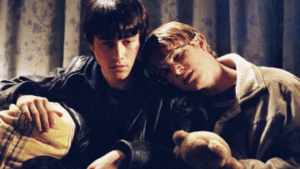 – Gregg Araki’s MYSTERIOUS SKIN explores the extremely different ways that two small boys in a small Kansas town are affected after being sexually molested by their little league coach when they were eight years old. The success of the film lies in Araki’s ability to help us understand the human condition and to simultaneously entertain us while doing so. The story line switches back and forth between the two boys as teenagers, interspersed with flashbacks of the two boys at the age of eight. A few dream sequences create a whirlwind of activity. Strong performances by Joseph Gordon-Leavitt and Brady Corbet add credence to the film’s premise. –bk – Gregg Araki’s MYSTERIOUS SKIN explores the extremely different ways that two small boys in a small Kansas town are affected after being sexually molested by their little league coach when they were eight years old. The success of the film lies in Araki’s ability to help us understand the human condition and to simultaneously entertain us while doing so. The story line switches back and forth between the two boys as teenagers, interspersed with flashbacks of the two boys at the age of eight. A few dream sequences create a whirlwind of activity. Strong performances by Joseph Gordon-Leavitt and Brady Corbet add credence to the film’s premise. –bk |
Buried Treasure |
 The Edukators 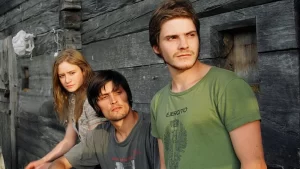 – Buoyed by top-notch acting and a wickedly comic, insightful script, Hans Weingartner’s THE EDUKATORS keeps us on the edge of our seats while it teaches us some valuable lessons about human nature, politics, ethics and integrity. Jan (Daniel Brühl) and Peter (Stipe Erceg) are longtime friends and roommates. They are activists and New Age anarchists. At night they break into McMansions, wreak havoc with the interiors by moving all the furniture around, ending with a signature stack of items in the middle of a large room. On the stack they pin notes such as “Your days of plenty are numbered,” or “You have too much money.” The notes are signed “The Edukators.” When love and bad timing get in the way of their lofty mission, their personal ethics and social consciences are sorely tested. –bk – Buoyed by top-notch acting and a wickedly comic, insightful script, Hans Weingartner’s THE EDUKATORS keeps us on the edge of our seats while it teaches us some valuable lessons about human nature, politics, ethics and integrity. Jan (Daniel Brühl) and Peter (Stipe Erceg) are longtime friends and roommates. They are activists and New Age anarchists. At night they break into McMansions, wreak havoc with the interiors by moving all the furniture around, ending with a signature stack of items in the middle of a large room. On the stack they pin notes such as “Your days of plenty are numbered,” or “You have too much money.” The notes are signed “The Edukators.” When love and bad timing get in the way of their lofty mission, their personal ethics and social consciences are sorely tested. –bk |
Côte d’Azur – The French are famous for their sex farces, and Olivier Ducastel and Jacques Martineau’s delightful film about a family vacationing at the patriarch’s childhood seaside home hits every right note even while doors slam, showers go cold, and misunderstandings fly. Impeccable timing and terrific and joyous acting is led by Valeria Bruni Tedeschi (5 x 2) and Gilbert Melki (who has already proven his acting abilities in Lucas Belvaux’s THE TRILOGY) there’s mistaken sexuality, unrequited love, secret lovers, and emerging realizations. Top it all off with note one, but two musical numbers, and you’ve got a film that’s sure to bring a smile to film lovers everywhere, without having to insult their intelligence. –mrc – The French are famous for their sex farces, and Olivier Ducastel and Jacques Martineau’s delightful film about a family vacationing at the patriarch’s childhood seaside home hits every right note even while doors slam, showers go cold, and misunderstandings fly. Impeccable timing and terrific and joyous acting is led by Valeria Bruni Tedeschi (5 x 2) and Gilbert Melki (who has already proven his acting abilities in Lucas Belvaux’s THE TRILOGY) there’s mistaken sexuality, unrequited love, secret lovers, and emerging realizations. Top it all off with note one, but two musical numbers, and you’ve got a film that’s sure to bring a smile to film lovers everywhere, without having to insult their intelligence. –mrc |
Torremolinos 73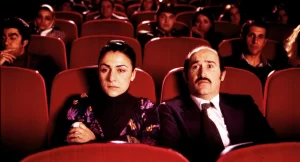 – Alfredo, a Spanish struggling door-to-door encyclopedia salesman, is offered a choice: participate in a series of ‘educational’ films his company will be producing for their Scandinavian market, or lose his job. Alfredo and his wife, Carmen, are initially reticent to participate, but the allure of 50 thousand pesetas per film wins out. The couple embarks on their first project, armed with a Super 8 camera and director’s megaphone emblazoned with the name ‘Bergman,’ gifted to Alfredo by a Dane who claims to have worked on several of the Swedish auteur’s films. The film is a hit and Carmen, encouraged by her husband and the realization that with more money they will be able to afford a family, agrees to make more films. Meanwhile Alfredo aspires to loftier cinematic goals, his masterpiece to be filmed in the titular Spanish resort town. This charming comedy is a humorous homage to Bergman clad in a perfectly ’70s beige-y color palette. –hn – Alfredo, a Spanish struggling door-to-door encyclopedia salesman, is offered a choice: participate in a series of ‘educational’ films his company will be producing for their Scandinavian market, or lose his job. Alfredo and his wife, Carmen, are initially reticent to participate, but the allure of 50 thousand pesetas per film wins out. The couple embarks on their first project, armed with a Super 8 camera and director’s megaphone emblazoned with the name ‘Bergman,’ gifted to Alfredo by a Dane who claims to have worked on several of the Swedish auteur’s films. The film is a hit and Carmen, encouraged by her husband and the realization that with more money they will be able to afford a family, agrees to make more films. Meanwhile Alfredo aspires to loftier cinematic goals, his masterpiece to be filmed in the titular Spanish resort town. This charming comedy is a humorous homage to Bergman clad in a perfectly ’70s beige-y color palette. –hn |
Tropical Malady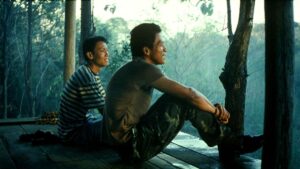 – TROPICAL MALADY is certainly one of the most thought-provoking and curious films of the year. This Thai import by director Apichatpong Weerasethakul (who goes by the appellation of Joe) kicks off as a sweetly romantic love story between two men, one an innocent villager, the other a worldly soldier. By the midpoint of the film, just as the sexual tension reaches a peak, the entire story and structure make a radical change, exploring myths, archetypes and desire. Or does it? Joe’s ingenious and audacious film makes it a worthy choice for a Buried Treasure nomination. –mrc – TROPICAL MALADY is certainly one of the most thought-provoking and curious films of the year. This Thai import by director Apichatpong Weerasethakul (who goes by the appellation of Joe) kicks off as a sweetly romantic love story between two men, one an innocent villager, the other a worldly soldier. By the midpoint of the film, just as the sexual tension reaches a peak, the entire story and structure make a radical change, exploring myths, archetypes and desire. Or does it? Joe’s ingenious and audacious film makes it a worthy choice for a Buried Treasure nomination. –mrc |
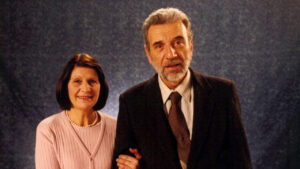 Whisky – This subtle, funny, well-acted film tells the story of Jacobo Köller (Andrés Pazos), the taciturn owner of a run-down sock factory in the capital city of Montevideo, Uruguay. When Jacobo’s successful younger brother Hermán (Jorge Bolani) arrives from Brazil for their late mother’s Matzeivah ceremony (at which her tombstone will be unveiled), Jacobo asks his forewoman Marta (Mirella Pascual) to pose as his wife… Up-and-coming directors Juan Pablo Rebella and Pablo Stoll’s depiction of Jacobo and Marta’s dreary, hum-drum lives and run-down workplace, and the fading resort city of Piriapolis can also be interpreted as a metaphor for the difficult economic times Uruguay has seen in recent years. WHISKY (which is what Uruguayans say instead of “cheese” when preparing to take a picture) is a fine example of what we can expect in the coming years from the next generation of Latin American filmmakers. –ad Whisky – This subtle, funny, well-acted film tells the story of Jacobo Köller (Andrés Pazos), the taciturn owner of a run-down sock factory in the capital city of Montevideo, Uruguay. When Jacobo’s successful younger brother Hermán (Jorge Bolani) arrives from Brazil for their late mother’s Matzeivah ceremony (at which her tombstone will be unveiled), Jacobo asks his forewoman Marta (Mirella Pascual) to pose as his wife… Up-and-coming directors Juan Pablo Rebella and Pablo Stoll’s depiction of Jacobo and Marta’s dreary, hum-drum lives and run-down workplace, and the fading resort city of Piriapolis can also be interpreted as a metaphor for the difficult economic times Uruguay has seen in recent years. WHISKY (which is what Uruguayans say instead of “cheese” when preparing to take a picture) is a fine example of what we can expect in the coming years from the next generation of Latin American filmmakers. –ad |
Best Director |
  Ang Lee for Brokeback Mountain – A perfect confluence of screenplay, director, locations and actors bring to stunning life the story of two sheepherders in 1960s Wyoming, who fall in love one summer, then spend the rest of their lives trying to recapture the moments of that first year on Brokeback Mountain. It is at heart both a gay romance between two individuals in love, and a cautionary tale to all about lives lived in fear. Lee gently weaves the two themes together with consummate skill, distancing the melodrama to more effectively get his point across. The stillness of his lead character is reflected in the stillness of the film. Each moment is distilled to the finest level of authenticity. –bc & mrc Ang Lee for Brokeback Mountain – A perfect confluence of screenplay, director, locations and actors bring to stunning life the story of two sheepherders in 1960s Wyoming, who fall in love one summer, then spend the rest of their lives trying to recapture the moments of that first year on Brokeback Mountain. It is at heart both a gay romance between two individuals in love, and a cautionary tale to all about lives lived in fear. Lee gently weaves the two themes together with consummate skill, distancing the melodrama to more effectively get his point across. The stillness of his lead character is reflected in the stillness of the film. Each moment is distilled to the finest level of authenticity. –bc & mrc |
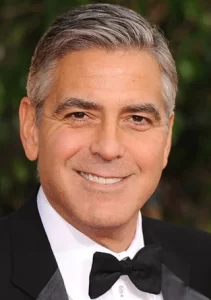 George Clooney for Good Night, and Good Luck – A sure sign a director knows what he is doing is illustrated by consistenly good choices. Filming GOOD NIGHT, AND GOOD LUCK in black and white and intermixing archival footage of the McCarthy hearings are two good choices George Clooney made. Another excellent choice is the tone-setting opening scene of an award ceremony at the Waldorf. The camera glides around the banquet room as we take in the body language at each table. The statements made by the clothing and jewelry speak volumes about the period. Clooney also gets terrific performances from his actors while keeping the story tight and focused. And then there is the smoke. Throughout the film, everyone is constantly smoking which creates an atmosphere of both mystery and tension. Clooney has proven that in addition to being a talented actor, he is a force to be reckoned with behind the camera. –bk & mrc George Clooney for Good Night, and Good Luck – A sure sign a director knows what he is doing is illustrated by consistenly good choices. Filming GOOD NIGHT, AND GOOD LUCK in black and white and intermixing archival footage of the McCarthy hearings are two good choices George Clooney made. Another excellent choice is the tone-setting opening scene of an award ceremony at the Waldorf. The camera glides around the banquet room as we take in the body language at each table. The statements made by the clothing and jewelry speak volumes about the period. Clooney also gets terrific performances from his actors while keeping the story tight and focused. And then there is the smoke. Throughout the film, everyone is constantly smoking which creates an atmosphere of both mystery and tension. Clooney has proven that in addition to being a talented actor, he is a force to be reckoned with behind the camera. –bk & mrc |
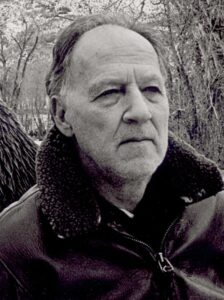 Werner Herzog for Grizzly Man – ather than taking a more traditional, “objective” approach to documenting the life of Timothy Treadwell and his devotion to grizzly bears, Herzog puts himself into the film. He combines Treadwell’s footage with interviews and his own narration, documenting his evolving attempt to understand Treadwell’s choices. He tries to remain nonjudgmental, although he is not afraid to voice his opinions. As he says at one point, in typical Herzog fashion, “Here I differ with Treadwell. He seemed to ignore the fact that in nature there are predators. I believe the common denominator of the universe is not harmony, but chaos, hostility, and murder.” By approaching the subject matter from this perspective, Herzog has constructed one of the most fascinating films of the year. –ad Werner Herzog for Grizzly Man – ather than taking a more traditional, “objective” approach to documenting the life of Timothy Treadwell and his devotion to grizzly bears, Herzog puts himself into the film. He combines Treadwell’s footage with interviews and his own narration, documenting his evolving attempt to understand Treadwell’s choices. He tries to remain nonjudgmental, although he is not afraid to voice his opinions. As he says at one point, in typical Herzog fashion, “Here I differ with Treadwell. He seemed to ignore the fact that in nature there are predators. I believe the common denominator of the universe is not harmony, but chaos, hostility, and murder.” By approaching the subject matter from this perspective, Herzog has constructed one of the most fascinating films of the year. –ad |
 Kim Ki-duk for 3-Iron – Korean filmmaker Ki-duk takes a further leap into the unknown with this follow-up to last year’s Chlotrudis Award-winner SPRING, SUMMER, FALL, WINTER… AND SPRING. With all of its predecessor’s gorgeous visual design and barely any dialogue, he sharply constructs a suspense film with a poetic twist. The nameless protagonist spends his days breaking into vacationing people’s homes—not to steal anything, only to “occupy” them temporarily, often even doing some of the chores. As he’s secretly discovered by one of the homeowners, Ki-duk’s film takes an intriguing turn toward the mystical. With innovative sound design and use of physical space, the director expresses a fascination with what is seen and what is not always apparent. –ck Kim Ki-duk for 3-Iron – Korean filmmaker Ki-duk takes a further leap into the unknown with this follow-up to last year’s Chlotrudis Award-winner SPRING, SUMMER, FALL, WINTER… AND SPRING. With all of its predecessor’s gorgeous visual design and barely any dialogue, he sharply constructs a suspense film with a poetic twist. The nameless protagonist spends his days breaking into vacationing people’s homes—not to steal anything, only to “occupy” them temporarily, often even doing some of the chores. As he’s secretly discovered by one of the homeowners, Ki-duk’s film takes an intriguing turn toward the mystical. With innovative sound design and use of physical space, the director expresses a fascination with what is seen and what is not always apparent. –ck |
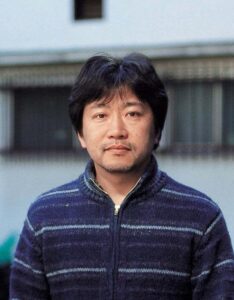 Hirokazu Koreeda for Nobody Knows – Hirokazu Koreeda, whose earlier AFTER LIFE took fifth place on the CSIF list of the top 100 foreign language films of all time, took the true story of a mother who abandoned her four young children in their Tokyo apartment and turned it into a subtle, heartbreaking and tender film from the perspective of the kids. Because the audience has perhaps a clearer understanding of the children’s situation than they do themselves, we watch them experiment with the freedom for which they’re not ready and we see how they deal with the fact that their plans, such as they are, don’t work out, all the while dreading what we fear they won’t see coming. –rg Hirokazu Koreeda for Nobody Knows – Hirokazu Koreeda, whose earlier AFTER LIFE took fifth place on the CSIF list of the top 100 foreign language films of all time, took the true story of a mother who abandoned her four young children in their Tokyo apartment and turned it into a subtle, heartbreaking and tender film from the perspective of the kids. Because the audience has perhaps a clearer understanding of the children’s situation than they do themselves, we watch them experiment with the freedom for which they’re not ready and we see how they deal with the fact that their plans, such as they are, don’t work out, all the while dreading what we fear they won’t see coming. –rg |
 Bennett Miller for Capote – Who would guess that a director with one credit to his name, a documentary about a Manhattan cruise line tour guide, would direct one of the year’s best films? Helped by his boyhood friends – a strong script from Dan Futterman and a tour-de-force performance from Philip Seymour Hoffman – Miller has made many good choices of his own as he engages the viewer despite the grim, complex subject matter. –ec Bennett Miller for Capote – Who would guess that a director with one credit to his name, a documentary about a Manhattan cruise line tour guide, would direct one of the year’s best films? Helped by his boyhood friends – a strong script from Dan Futterman and a tour-de-force performance from Philip Seymour Hoffman – Miller has made many good choices of his own as he engages the viewer despite the grim, complex subject matter. –ec |
 Wong Kar-wai for 2046 – With 2046 Wong Kar Wai has created a film that is a stunning, entrancing visual masterpiece. As in many of his other works he lets his images, more than the dialogue, drive the narrative, although with 2046 he certainly creates a multi-layered plot that weaves elements of romance and science fiction to create a spellbinding tale. Wong Kar Wai’s attention to detail is evidenced in every aspect of 2046: the set design, the soundtrack, the cinematography, the casting, the acting and the editing. –bk & mrc Wong Kar-wai for 2046 – With 2046 Wong Kar Wai has created a film that is a stunning, entrancing visual masterpiece. As in many of his other works he lets his images, more than the dialogue, drive the narrative, although with 2046 he certainly creates a multi-layered plot that weaves elements of romance and science fiction to create a spellbinding tale. Wong Kar Wai’s attention to detail is evidenced in every aspect of 2046: the set design, the soundtrack, the cinematography, the casting, the acting and the editing. –bk & mrc |
Best Actress |
  Marilou Berry for the role of Lolita Cassard in Look at Me – Marilou Berry, previously cast in such French comedies as ONCE UPON A TIME IN THE OUED (Il était une fois dans l’oued), and THE BLACK BOX (Boîte noire, La), plays Lolita in the film LOOK AT ME. Lolita is a self-conscious, put-upon, insecure and neglected daughter of a famous writer. Yet Berry portrays the character Lolita as more than your typical tragic victim excluded by a society that doesn’t value her. Berry embodies a young woman who is so distracted by her own and others’ shortcomings that she doesn’t realize that she, too, is capable of opportunistic manipulation (or neglect) of other people. This actress shows remarkably fine character development, painting Lolita as a thoroughly self-absorbed and pathetic (at the same time sweet and clueless) individual, which allows viewers to love her (along with the other zeros in her life) without hesitation. –ec Marilou Berry for the role of Lolita Cassard in Look at Me – Marilou Berry, previously cast in such French comedies as ONCE UPON A TIME IN THE OUED (Il était une fois dans l’oued), and THE BLACK BOX (Boîte noire, La), plays Lolita in the film LOOK AT ME. Lolita is a self-conscious, put-upon, insecure and neglected daughter of a famous writer. Yet Berry portrays the character Lolita as more than your typical tragic victim excluded by a society that doesn’t value her. Berry embodies a young woman who is so distracted by her own and others’ shortcomings that she doesn’t realize that she, too, is capable of opportunistic manipulation (or neglect) of other people. This actress shows remarkably fine character development, painting Lolita as a thoroughly self-absorbed and pathetic (at the same time sweet and clueless) individual, which allows viewers to love her (along with the other zeros in her life) without hesitation. –ec |
 Emmanuelle Devos for the role of Nora Cotterelle in Kings and Queen – After her deftly manipulative performance in 2002’s READ MY LIPS for which she received her first Chlotrudis nomination in this category, Emmanuelle Devos returns to the ballot overcoming a daunting challenge: playing a leading character that comes across at first glance as unsympathetic. Nora Cotterelle has suffered a difficult youth, with a controlling father, a first husband who died tragically, and a second husband who is currently in an institution. Now she appears competent, sexy and slightly cold. Devos, however, layers Nora with many emotions, making her so complex that we’re not really sure if we should villify her, feel sorry for her, or admire her for getting her life together and raising her son the best way she can. –mrc Emmanuelle Devos for the role of Nora Cotterelle in Kings and Queen – After her deftly manipulative performance in 2002’s READ MY LIPS for which she received her first Chlotrudis nomination in this category, Emmanuelle Devos returns to the ballot overcoming a daunting challenge: playing a leading character that comes across at first glance as unsympathetic. Nora Cotterelle has suffered a difficult youth, with a controlling father, a first husband who died tragically, and a second husband who is currently in an institution. Now she appears competent, sexy and slightly cold. Devos, however, layers Nora with many emotions, making her so complex that we’re not really sure if we should villify her, feel sorry for her, or admire her for getting her life together and raising her son the best way she can. –mrc |
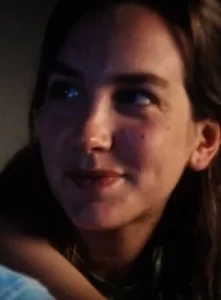 Kate Dollenmayer for the role of Marnie in Funny Ha Ha – Two things set Andrew Bujalski’s Boston-shot, low-budget debut feature apart from scores of likeminded first efforts: a truly original screenplay with a knack for showing how people really interact with each other, and a heroine fully capable of getting the subtleties in those oft-inarticulate exchanges across. As 23-year-old Marnie, Dollenmayer (who had previously only worked as an animator on Richard Linklater’s WAKING LIFE) successfully embodies a persona relatable to most: the overeducated but somewhat aimless recent college graduate slowly adjusting to the real world. However, Dollenmayer’s natural, nuanced performance gives Marnie a depth you rarely see in movies about twentysomethings: she makes something as seemingly minute as a facial reaction shot speak volumes about her perspective. –ck Kate Dollenmayer for the role of Marnie in Funny Ha Ha – Two things set Andrew Bujalski’s Boston-shot, low-budget debut feature apart from scores of likeminded first efforts: a truly original screenplay with a knack for showing how people really interact with each other, and a heroine fully capable of getting the subtleties in those oft-inarticulate exchanges across. As 23-year-old Marnie, Dollenmayer (who had previously only worked as an animator on Richard Linklater’s WAKING LIFE) successfully embodies a persona relatable to most: the overeducated but somewhat aimless recent college graduate slowly adjusting to the real world. However, Dollenmayer’s natural, nuanced performance gives Marnie a depth you rarely see in movies about twentysomethings: she makes something as seemingly minute as a facial reaction shot speak volumes about her perspective. –ck |
 Ronit Elkabetz for the role of Ruthie in Or (My Treasure) – As Or’s mother Ruthie, Elkabetz is a broken woman. She has worked as a prostitute for years and despite her daughter’s earnest pleas, she finds herself unable to give up her dangerous lifestyle. Elkabetz is marvelous, her Ruthie generally lost in a weary malaise that inhabits her to her bones; The role reversal she exhibits with Or, (note the childish interpretation of her name) is organic in their relationship, yet Ruthie is still clearly a loving mother to her daughter. Her inadequate attempts to change her life and be that mother her daughter needs is both powerful and heartbreaking. –mrc Ronit Elkabetz for the role of Ruthie in Or (My Treasure) – As Or’s mother Ruthie, Elkabetz is a broken woman. She has worked as a prostitute for years and despite her daughter’s earnest pleas, she finds herself unable to give up her dangerous lifestyle. Elkabetz is marvelous, her Ruthie generally lost in a weary malaise that inhabits her to her bones; The role reversal she exhibits with Or, (note the childish interpretation of her name) is organic in their relationship, yet Ruthie is still clearly a loving mother to her daughter. Her inadequate attempts to change her life and be that mother her daughter needs is both powerful and heartbreaking. –mrc |
 Nathalie Press for the role of Mona in My Summer of Love – Nathalie Press makes her feature film debut in MY SUMMER OF LOVE. Her work in the film won the British Independent Film Award for Best Actress, the Best British Newcomer award given by London Film Critic, and the Evening Standard British Film Award for Most Promising Newcomer–which she shared with Emily Blunt. Such avid praise is well-earned by this actress whose dramatic representation of Mona is no short of stunning. Press is able to carve a great deal of depth into her character’s personality and she demonstrates remarkable skill in her ability to execute a broad range of demanding scenes. Indeed, Nathalie Press deserves high praise for having delivered one of the single best debut performances of all time. –ec Nathalie Press for the role of Mona in My Summer of Love – Nathalie Press makes her feature film debut in MY SUMMER OF LOVE. Her work in the film won the British Independent Film Award for Best Actress, the Best British Newcomer award given by London Film Critic, and the Evening Standard British Film Award for Most Promising Newcomer–which she shared with Emily Blunt. Such avid praise is well-earned by this actress whose dramatic representation of Mona is no short of stunning. Press is able to carve a great deal of depth into her character’s personality and she demonstrates remarkable skill in her ability to execute a broad range of demanding scenes. Indeed, Nathalie Press deserves high praise for having delivered one of the single best debut performances of all time. –ec |
Best Actor |
  Philip Seymour Hoffman for the role of Truman Capote in Capote – In a career-defining performance, Hoffman brings to life another artist’s own career-defining moment in time: Truman Capote during his research for and writing of his novel In Cold Blood. With astonishing skill, Hoffman masters Capote’s distinctive voice and mannerisms even as he downplays them, the better to bring forth the complexities and layers of the writer’s inner life. –bc Philip Seymour Hoffman for the role of Truman Capote in Capote – In a career-defining performance, Hoffman brings to life another artist’s own career-defining moment in time: Truman Capote during his research for and writing of his novel In Cold Blood. With astonishing skill, Hoffman masters Capote’s distinctive voice and mannerisms even as he downplays them, the better to bring forth the complexities and layers of the writer’s inner life. –bc |
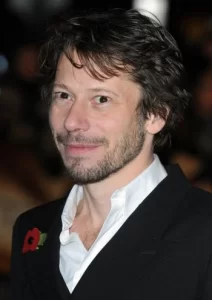 Mathieu Amalric for the role of Ismaël Vuillard in Kings and Queen – Amalric gives a delightfully manic performance as Ismaël Vuillard, an eccentric professional viol player. In and out of an institution throughout the film, Ismaël proves to be pathological and unbalanced, though undeniably charming and smart with a strong family connection. Strangely enough, despite his serious issues, Ismaël just might be the best parent for his ex-wife’s son, Elias, and it is the exploration of this notion that results in some of the most moving scenes in this film. –hn Mathieu Amalric for the role of Ismaël Vuillard in Kings and Queen – Amalric gives a delightfully manic performance as Ismaël Vuillard, an eccentric professional viol player. In and out of an institution throughout the film, Ismaël proves to be pathological and unbalanced, though undeniably charming and smart with a strong family connection. Strangely enough, despite his serious issues, Ismaël just might be the best parent for his ex-wife’s son, Elias, and it is the exploration of this notion that results in some of the most moving scenes in this film. –hn |
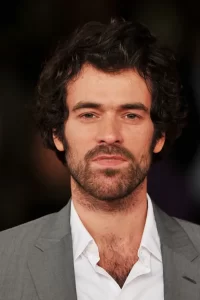 Romain Duris for the role of Thomas Seyr in The Beat That My Heart Skipped – THE BEAT THAT MY HEART SKIPPED delivers on every level but it is the transcendence of Romain Duris as Thomas Seyr that pulls all of the pieces together. Thomas is a petty Thug who has inherited his professional acumen from his father. Thomas’ deceased mother was a concert pianist and many music professionals believed that he had inherited her talent. Duris has total grasp of his character, a man whose exterior self and interior being are genetically and emotionally worlds apart. He makes the conflict of his character seem truly plausible. –bk Romain Duris for the role of Thomas Seyr in The Beat That My Heart Skipped – THE BEAT THAT MY HEART SKIPPED delivers on every level but it is the transcendence of Romain Duris as Thomas Seyr that pulls all of the pieces together. Thomas is a petty Thug who has inherited his professional acumen from his father. Thomas’ deceased mother was a concert pianist and many music professionals believed that he had inherited her talent. Duris has total grasp of his character, a man whose exterior self and interior being are genetically and emotionally worlds apart. He makes the conflict of his character seem truly plausible. –bk |
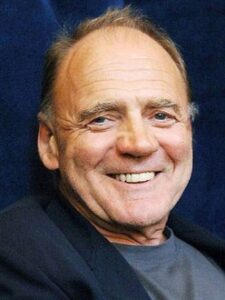 Bruno Ganz for the role of Adolf Hitler in Downfall – Bruno Ganz’ portrayal of Adolph Hitler is chilling. Unlike other actors who have played the part, he exudes a quiet sort of menace which is even visible in his attempts to show a gentle side of his personality with the Goebbels children. His descent into true madness is as mesmerizing as it is disturbing. –bl Bruno Ganz for the role of Adolf Hitler in Downfall – Bruno Ganz’ portrayal of Adolph Hitler is chilling. Unlike other actors who have played the part, he exudes a quiet sort of menace which is even visible in his attempts to show a gentle side of his personality with the Goebbels children. His descent into true madness is as mesmerizing as it is disturbing. –bl |
 Heath Ledger for the role of Ennis Delmar in Brokeback Mountain – Without a doubt, the film BROKEBACK MOUNTAIN would not have worked if not for Heath Ledger’s performance as Ennis Del Mar. In this role, Ledger’s challenge was to portray unrequited passion in a character who bottled up all his feelings and experiences. In those few moments in the film in which Ennis is forced to confront his situation, Ledger displays Ennis’ emotions in such a manner that the audience can’t help but be swept up in his passion, frustration, shame, and sorrow. –gc Heath Ledger for the role of Ennis Delmar in Brokeback Mountain – Without a doubt, the film BROKEBACK MOUNTAIN would not have worked if not for Heath Ledger’s performance as Ennis Del Mar. In this role, Ledger’s challenge was to portray unrequited passion in a character who bottled up all his feelings and experiences. In those few moments in the film in which Ennis is forced to confront his situation, Ledger displays Ennis’ emotions in such a manner that the audience can’t help but be swept up in his passion, frustration, shame, and sorrow. –gc |
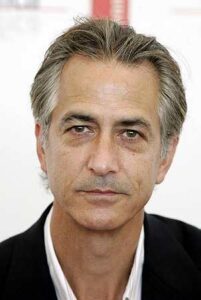 David Strathairn in the role of Edward R. Murrow in Good Night, and Good Luck – One of the busiest actors in film, David Strathairn gained his reputation largely because of his frequent appearances in the films of John Sayles. Slowly he has come into his own. His role as Edward R. Murrow in GOOD NIGHT, AND GOOD LUCK places him in a brand new league. As Murrow, Strathairn captures the essence of his character simply and efficiently. In doing so, he keeps the film focused on the historical significance of what happened at CBS during the McCarthy era. –bk David Strathairn in the role of Edward R. Murrow in Good Night, and Good Luck – One of the busiest actors in film, David Strathairn gained his reputation largely because of his frequent appearances in the films of John Sayles. Slowly he has come into his own. His role as Edward R. Murrow in GOOD NIGHT, AND GOOD LUCK places him in a brand new league. As Murrow, Strathairn captures the essence of his character simply and efficiently. In doing so, he keeps the film focused on the historical significance of what happened at CBS during the McCarthy era. –bk |
Best Supporting Actress |
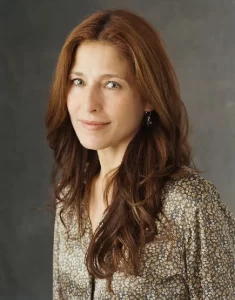  Catherine Keener for the role of Harper Lee in Capote – Chlotrudis Awards-winner Catherine Keener underplays the role of Harper Lee, Truman Capote’s long suffering friend, so well that you can forget she is acting. Her acceptance of his quirks and self-centeredness is played out beautifully in her acceptance of his dismissing her work at the gala where she is being feted for To Kill A Mockingbird. She brings a sense of reality and normalcy to a friendship that for most would be hard to accept. –bl Catherine Keener for the role of Harper Lee in Capote – Chlotrudis Awards-winner Catherine Keener underplays the role of Harper Lee, Truman Capote’s long suffering friend, so well that you can forget she is acting. Her acceptance of his quirks and self-centeredness is played out beautifully in her acceptance of his dismissing her work at the gala where she is being feted for To Kill A Mockingbird. She brings a sense of reality and normalcy to a friendship that for most would be hard to accept. –bl |
 Corinna Harfouch for the role of Magda Goebbels in Downfall – Corinna Harfouch may have difficulty finding a career topper after DOWNFALL in which she plays Magda Goebbels the wife of the heinous Joseph Goebbels. As Hitler pins a swastika on her chest she beams “you’ve made me the proudest woman in Germany.” Not too many hours later she bids farewell to her children with spine-chilling sang-froid, one of the most disturbing scenes in cinematic history. –tg Corinna Harfouch for the role of Magda Goebbels in Downfall – Corinna Harfouch may have difficulty finding a career topper after DOWNFALL in which she plays Magda Goebbels the wife of the heinous Joseph Goebbels. As Hitler pins a swastika on her chest she beams “you’ve made me the proudest woman in Germany.” Not too many hours later she bids farewell to her children with spine-chilling sang-froid, one of the most disturbing scenes in cinematic history. –tg |
 Sandra Oh for the role of Carol French in Wilby Wonderful – No one plays comedy and drama simultaneously as well as Sandra Oh. Look at her stunning work in Don McKellar’s Last Night for which she was nominated for Best Actress in 2000 and see her gracefully come to the end of the world in a role that favors her dramatic talent. Then look at the depth she gives Carol French, a neurotic, self-involved real estate agent looking for a way off the tiny maritime island Wilby and back to civilization… or at least culture. Oh serves up the comic high points of Wilby to be sure; whether she’s telling her assistant Dina to “chop, chop,” or racing around an empty house to save Dan Jarvis. She also shows her stuff dramatically, when she moves from anger to frustration while venting at Duck for messing up her “Wonderful Wilby” sign. But it’s those subtle and swift shifts from one to another that make you stop and catch your breath. Watch Oh’s face as she plows forward in pure real estate agent mode, when her husband Buddy makes an offhand remark that catc her her totally off guard. Her mask slips ever so slightly and the emotions are there, ever-so evident on her expressive face. Oh deserves a string of lead roles that allow her to really stretch and show some larger international audiences what she’s capable of. For now, I’m happy that the members of Chlotrudis recognize a true talent. — mrc Sandra Oh for the role of Carol French in Wilby Wonderful – No one plays comedy and drama simultaneously as well as Sandra Oh. Look at her stunning work in Don McKellar’s Last Night for which she was nominated for Best Actress in 2000 and see her gracefully come to the end of the world in a role that favors her dramatic talent. Then look at the depth she gives Carol French, a neurotic, self-involved real estate agent looking for a way off the tiny maritime island Wilby and back to civilization… or at least culture. Oh serves up the comic high points of Wilby to be sure; whether she’s telling her assistant Dina to “chop, chop,” or racing around an empty house to save Dan Jarvis. She also shows her stuff dramatically, when she moves from anger to frustration while venting at Duck for messing up her “Wonderful Wilby” sign. But it’s those subtle and swift shifts from one to another that make you stop and catch your breath. Watch Oh’s face as she plows forward in pure real estate agent mode, when her husband Buddy makes an offhand remark that catc her her totally off guard. Her mask slips ever so slightly and the emotions are there, ever-so evident on her expressive face. Oh deserves a string of lead roles that allow her to really stretch and show some larger international audiences what she’s capable of. For now, I’m happy that the members of Chlotrudis recognize a true talent. — mrc |
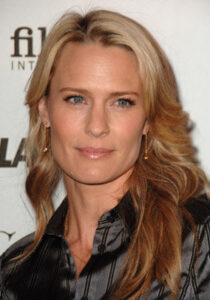 Robin Wright Penn for the role of Diana in Nine Lives – She’s only onscreen for less than fifteen minutes, but Robin Wright Penn leaves an indelible impression in Rodrigo Garcia’s film, which consists of nine sections—each one shot in a single take and named after its primary female character. In the second vignette, she plays Diana, a pregnant woman who, while grocery shopping, bumps into Damian (Jason Isaacs), an old flame she hasn’t spoken to in years. She is completely caught off guard and noticeably shaken by his reappearance. Thanks to Wright Penn’s intense, tour-de-force performance, you get a vivid sense of the complex, messy flood of conflicting emotions this chance encounter causes Diana, and she leaves the audience shaken as well. –ck Robin Wright Penn for the role of Diana in Nine Lives – She’s only onscreen for less than fifteen minutes, but Robin Wright Penn leaves an indelible impression in Rodrigo Garcia’s film, which consists of nine sections—each one shot in a single take and named after its primary female character. In the second vignette, she plays Diana, a pregnant woman who, while grocery shopping, bumps into Damian (Jason Isaacs), an old flame she hasn’t spoken to in years. She is completely caught off guard and noticeably shaken by his reappearance. Thanks to Wright Penn’s intense, tour-de-force performance, you get a vivid sense of the complex, messy flood of conflicting emotions this chance encounter causes Diana, and she leaves the audience shaken as well. –ck |
 Jung-ah Yum for the role of Eun-joo (stepmother) in A Tale of Two Sisters – Yum Jung-ah’s role in A TALE OF TWO SISTERS, a gothic tale of psychological horror, is a pivotal one, for her behavior lends credibility to the underlying story that slowly emerges. She is coy and kittenish with her husband, at times adoring and doting with the girls, sometimes creepy and vicious as a wicked stepmother. Given a rare and versatile acting opportunity, Yum Jung-ah shines brightly. –bk Jung-ah Yum for the role of Eun-joo (stepmother) in A Tale of Two Sisters – Yum Jung-ah’s role in A TALE OF TWO SISTERS, a gothic tale of psychological horror, is a pivotal one, for her behavior lends credibility to the underlying story that slowly emerges. She is coy and kittenish with her husband, at times adoring and doting with the girls, sometimes creepy and vicious as a wicked stepmother. Given a rare and versatile acting opportunity, Yum Jung-ah shines brightly. –bk |
 Zhang Ziyi for the role of Bai Ling in 2046 – In what is arguably the actress’ first successful foray into award-worthy acting, Zhang Ziyi confounds and moves as Bai Ling in Wong Kar-wai’s masterpiece, 2046. Gone is the pouty aristocrat and the innocent child of earlier performances; or rather, the two are still there, but they are part of something more three-dimensional. It is a testament to Ziyi’s acting that despite her elegant beauty, it took me several scenes to realize it was her in the role. With added experience and maturity Zhang Ziyi is sure to appear here again in the future. –mrc Zhang Ziyi for the role of Bai Ling in 2046 – In what is arguably the actress’ first successful foray into award-worthy acting, Zhang Ziyi confounds and moves as Bai Ling in Wong Kar-wai’s masterpiece, 2046. Gone is the pouty aristocrat and the innocent child of earlier performances; or rather, the two are still there, but they are part of something more three-dimensional. It is a testament to Ziyi’s acting that despite her elegant beauty, it took me several scenes to realize it was her in the role. With added experience and maturity Zhang Ziyi is sure to appear here again in the future. –mrc |
Best Supporting Actor |
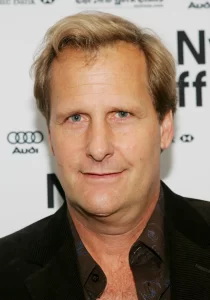  Jeff Daniels for the role of Bernard Berkman in The Squid and the Whale – Ever since the days of SOMETHING WILD, TERMS OF ENDEARMENT and THE PURPLE ROSE OF CAIRO it was evident that Jeff Daniels has extraordinary talent. Unfortunately, over the years he has become better known for his role in DUMB & DUMBER, despite a Chlotrudis nomination for his role in the family film FLY AWAY HOME. Hopefully his outstanding performance in THE SQUID AND THE WHALE will get his reputation back on track. Playing a dad in the middle of a divorce, a mid-life crisis and a custodial battle involving his two children, Daniels’ performance is one of his very best. –bk Jeff Daniels for the role of Bernard Berkman in The Squid and the Whale – Ever since the days of SOMETHING WILD, TERMS OF ENDEARMENT and THE PURPLE ROSE OF CAIRO it was evident that Jeff Daniels has extraordinary talent. Unfortunately, over the years he has become better known for his role in DUMB & DUMBER, despite a Chlotrudis nomination for his role in the family film FLY AWAY HOME. Hopefully his outstanding performance in THE SQUID AND THE WHALE will get his reputation back on track. Playing a dad in the middle of a divorce, a mid-life crisis and a custodial battle involving his two children, Daniels’ performance is one of his very best. –bk |
 Paddy Considine for the role of Phil in My Summer of Love – It would be easy to turn a Scottish, hard-drinking ne-er-do-well who becomes zealous after finding God into a two-dimensional caricature, but Considine, refuses to go the easy route. There is a closeness to the relationship Phil shares with his sister Mona (the also-nominated Nathalie Press) that Considine plays naturally. His religious conversion is all-the-more shocking because Considine allows us to see glimpses of struggle and violence behind the placid demeanor. When that spirituality is tested, his response is both expected and sad. Considine’s electric performance as Phil is light-year’s away from that of Alfie in Pawel Pawlikowski’s debut feature, LAST RESORT. –mrc Paddy Considine for the role of Phil in My Summer of Love – It would be easy to turn a Scottish, hard-drinking ne-er-do-well who becomes zealous after finding God into a two-dimensional caricature, but Considine, refuses to go the easy route. There is a closeness to the relationship Phil shares with his sister Mona (the also-nominated Nathalie Press) that Considine plays naturally. His religious conversion is all-the-more shocking because Considine allows us to see glimpses of struggle and violence behind the placid demeanor. When that spirituality is tested, his response is both expected and sad. Considine’s electric performance as Phil is light-year’s away from that of Alfie in Pawel Pawlikowski’s debut feature, LAST RESORT. –mrc |
 Jesse Eisenberg for the role of Walt Berkman in The Squid and the Whale– Eisenberg holds his own among this drama’s strong cast, playing the older son of two writers going through a divorce in 80’s Brooklyn. Jesse Eisenberg for the role of Walt Berkman in The Squid and the Whale– Eisenberg holds his own among this drama’s strong cast, playing the older son of two writers going through a divorce in 80’s Brooklyn.Eisenberg’s Walt is both his father’s son, passing his father’s literary opinions off as his own, and his father’s rival, attracted to the same co-ed student. This young actor more than ably conveys Walt’s rage, confusion, envy and insecurity as he tries to navigate through his family’s turmoil as well as his own. –bc |
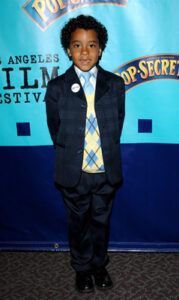 Brandon Ratcliff for the role of Robby Swersey in Me and You and Everyone We Know – In a film about the risks we take to make a personal connection in this day and age, it’s a bold choice to include a pivotal role to be played by a six-year-old boy. But it all comes together when Brandon Ratcliff plays Robby Swersey. In a household that consists of just his distracted, newly-single father and his somber, introverted older brother, Robby has a difficult time figuring out what life is all about. With only the words and actions available to a young boy, Brandon fluently conveys his desire to connect with others – most notably in the film’s most memorable exchange with a stranger in an Internet chat room. Without ever relying on any of the “cute kid” tricks, Brandon captures the essence of the film’s message and, while he’s at it, he captures our hearts as well. –sc Brandon Ratcliff for the role of Robby Swersey in Me and You and Everyone We Know – In a film about the risks we take to make a personal connection in this day and age, it’s a bold choice to include a pivotal role to be played by a six-year-old boy. But it all comes together when Brandon Ratcliff plays Robby Swersey. In a household that consists of just his distracted, newly-single father and his somber, introverted older brother, Robby has a difficult time figuring out what life is all about. With only the words and actions available to a young boy, Brandon fluently conveys his desire to connect with others – most notably in the film’s most memorable exchange with a stranger in an Internet chat room. Without ever relying on any of the “cute kid” tricks, Brandon captures the essence of the film’s message and, while he’s at it, he captures our hearts as well. –sc |
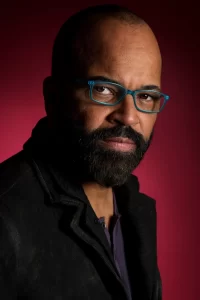 Jeffrey Wright for the role of Winston in Broken Flowers – Wright plays Winston, next-door neighbor of aging lothario Don Johnston. Don appears to have an ideal life: money, beautiful women, and an expensively-decorated house. By contrast, Winston’s life is one of happy chaos, centering on his wife and young children. Winston’s authentic enthusiasm for life shows Don that there are other options in life, and that it might not be too late for him. Thus, Winston encourages Don to pursue the mystery of his long-lost son, happily drawing up itineraries, booking rental cars, and insisting that Don bring flowers to his former lovers. Winston gets to play detective and cheerleader, encouraging Don on his quest, despite some significant bumps in the road. –hn Jeffrey Wright for the role of Winston in Broken Flowers – Wright plays Winston, next-door neighbor of aging lothario Don Johnston. Don appears to have an ideal life: money, beautiful women, and an expensively-decorated house. By contrast, Winston’s life is one of happy chaos, centering on his wife and young children. Winston’s authentic enthusiasm for life shows Don that there are other options in life, and that it might not be too late for him. Thus, Winston encourages Don to pursue the mystery of his long-lost son, happily drawing up itineraries, booking rental cars, and insisting that Don bring flowers to his former lovers. Winston gets to play detective and cheerleader, encouraging Don on his quest, despite some significant bumps in the road. –hn |
Best Original Screenplay |
  Me and You and Everyone We Know, screenplay by Miranda July – Miranda July has created a fantastically original screenplay with a wide variety of characters in her debut film. The film shows a complex cast and their interactions with each other; some small and poignant, others large and grandiose in their themes. The script anchors the film by being lively and generous in its explorations, yet never too pedantic or straight-forward. Each character has a role to play and the story that unfolds is whimsical to behold. –clk Me and You and Everyone We Know, screenplay by Miranda July – Miranda July has created a fantastically original screenplay with a wide variety of characters in her debut film. The film shows a complex cast and their interactions with each other; some small and poignant, others large and grandiose in their themes. The script anchors the film by being lively and generous in its explorations, yet never too pedantic or straight-forward. Each character has a role to play and the story that unfolds is whimsical to behold. –clk |
 3-Iron, screenplay by Kim Ki-duk – Korean cinema is doing very well right now, outproducing even the once strong Hong Kong industry by miles. One of Korea’s hottest directors, Ki-duk Kim, writes this quiet film, interspersed with brief, violent flashes. A complex story about intertwining and disappearing from view, yet still existing, a story told by itself. Innovative, poetic and unexpected, 3-Iron is one of the 21st centuries’ first masterpieces. –tg 3-Iron, screenplay by Kim Ki-duk – Korean cinema is doing very well right now, outproducing even the once strong Hong Kong industry by miles. One of Korea’s hottest directors, Ki-duk Kim, writes this quiet film, interspersed with brief, violent flashes. A complex story about intertwining and disappearing from view, yet still existing, a story told by itself. Innovative, poetic and unexpected, 3-Iron is one of the 21st centuries’ first masterpieces. –tg |
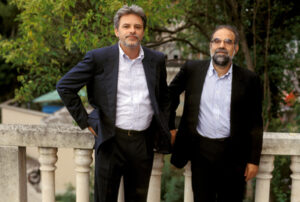 The Best of Youth, screenplay by Sandro Petraglia and Stefano Rulli – It’s notoriously difficult for any film to fully capture forty years of a country’s history in a few hours without coming across like a truncated clip reel. The same could be said for attempting to tell one family’s saga within that same timeframe. Miraculously, THE BEST OF YOUTH does justice to each narrative strand, intertwining them until the personal and the political fluidly merge. We see both the Carati family and an entire nation face floods, riots, abandonment, assassinations and deaths. Yet, through all these tense moments, Sandro Petraglia’s and Stefano Rulli’s screenplay (resembling a generously stuffed novel) manages to project a warm, inviting glow, especially as the final scenes beautifully echo moments from the film’s first hour. –ck The Best of Youth, screenplay by Sandro Petraglia and Stefano Rulli – It’s notoriously difficult for any film to fully capture forty years of a country’s history in a few hours without coming across like a truncated clip reel. The same could be said for attempting to tell one family’s saga within that same timeframe. Miraculously, THE BEST OF YOUTH does justice to each narrative strand, intertwining them until the personal and the political fluidly merge. We see both the Carati family and an entire nation face floods, riots, abandonment, assassinations and deaths. Yet, through all these tense moments, Sandro Petraglia’s and Stefano Rulli’s screenplay (resembling a generously stuffed novel) manages to project a warm, inviting glow, especially as the final scenes beautifully echo moments from the film’s first hour. –ck |
 The Squid and the Whale, screenplay by Noah Baumbach – Writer-director Baumbach plumbs his own experience to tell the tale of a 1980s Brooklyn family, The Berkmans, struggling with impending divorce and all of the resultant issues. The result is a darkly funny and painful tale of four people dealing with very real and raw emotions, as they attempt to re-define their relationships with one another. –hn The Squid and the Whale, screenplay by Noah Baumbach – Writer-director Baumbach plumbs his own experience to tell the tale of a 1980s Brooklyn family, The Berkmans, struggling with impending divorce and all of the resultant issues. The result is a darkly funny and painful tale of four people dealing with very real and raw emotions, as they attempt to re-define their relationships with one another. –hn |
 Wilby Wonderful, screenplay by Daniel MacIvor– It’s a small island off the coast of Nova Scotia, but in many ways, it feels like it could be any small North American town. The question might be “Islander or mainlander?” but the meaning is clearly deeper. All of the central characters struggle with a secret wish to be loved – a wish stifled so long that it becomes a hidden shame. But a story is all in the telling and multiple Chlotrudis nominee and winner of two awards, writer/director/actor Daniel MacIvor tells the story with joy, wit, and grace. Best known for penning small-cast plays (often, a cast of one), MacIvor neatly intertwines the stories of no less than six central characters into a rare cinematic event: a smart, meaningful comedy. He never wastes a word, a reference, or an opportunity for humor – be it dark, witty, or screwball. And that is why WILBY WONDERFUL is one of the strongest and most enjoyable comic screenplays of recent years. –sc Wilby Wonderful, screenplay by Daniel MacIvor– It’s a small island off the coast of Nova Scotia, but in many ways, it feels like it could be any small North American town. The question might be “Islander or mainlander?” but the meaning is clearly deeper. All of the central characters struggle with a secret wish to be loved – a wish stifled so long that it becomes a hidden shame. But a story is all in the telling and multiple Chlotrudis nominee and winner of two awards, writer/director/actor Daniel MacIvor tells the story with joy, wit, and grace. Best known for penning small-cast plays (often, a cast of one), MacIvor neatly intertwines the stories of no less than six central characters into a rare cinematic event: a smart, meaningful comedy. He never wastes a word, a reference, or an opportunity for humor – be it dark, witty, or screwball. And that is why WILBY WONDERFUL is one of the strongest and most enjoyable comic screenplays of recent years. –sc |
Best Adapted Screenplay |
  Brokeback Mountain, screenplay by Larry McMurtry and Diana Ossana, based on the short story by E. Annie Proulx – Diana Ossama Larry McMurtry take E. Annie Proulx’ short story and do a rare and wonderful thing. They stayed true to the plot and mood of the original heartbreaking tale of two 1960s cowboys, while deepening its themes to show how the world they lived in shaped their decisions, and how the decisions they made shaped their worlds. –bc Brokeback Mountain, screenplay by Larry McMurtry and Diana Ossana, based on the short story by E. Annie Proulx – Diana Ossama Larry McMurtry take E. Annie Proulx’ short story and do a rare and wonderful thing. They stayed true to the plot and mood of the original heartbreaking tale of two 1960s cowboys, while deepening its themes to show how the world they lived in shaped their decisions, and how the decisions they made shaped their worlds. –bc |
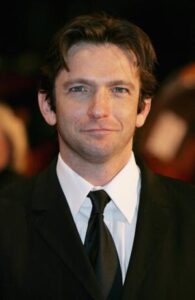 Capote, screenplay by Dan Futterman, based on the book by Gerald Clarke – Dan Futterman’s screenplay, chronicling Truman Capote’s research and writing of In Cold Blood in the late 1950s and early 1960s, is adapted from the biography by Gerald Clarke. It is a testament to his screenplay that, with very little prior knowledge of Truman Capote or In Cold Blood, we came out of the theater feeling that the film had presented a complete, fully realized portrait of the writer and that particular period in his life. In many respects, Capote is not a very sympathetic character, which makes it a challenge to get the audience to care about him. Futterman is able to do so by capturing the very different worlds – rural Kansas and high-society New York – that Capote was drawn into, enabling the audience to better understand his often-contradictory motivations and the conflicts he had to deal with. –ad Capote, screenplay by Dan Futterman, based on the book by Gerald Clarke – Dan Futterman’s screenplay, chronicling Truman Capote’s research and writing of In Cold Blood in the late 1950s and early 1960s, is adapted from the biography by Gerald Clarke. It is a testament to his screenplay that, with very little prior knowledge of Truman Capote or In Cold Blood, we came out of the theater feeling that the film had presented a complete, fully realized portrait of the writer and that particular period in his life. In many respects, Capote is not a very sympathetic character, which makes it a challenge to get the audience to care about him. Futterman is able to do so by capturing the very different worlds – rural Kansas and high-society New York – that Capote was drawn into, enabling the audience to better understand his often-contradictory motivations and the conflicts he had to deal with. –ad |
 Mysterious Skin, screenply by Gregg Araki, based on the book by Scott Heim – There is a maturity in Araki’s screenplay for MYSTERIOUS SKIN that has been lacking in the director’s work to date. Building from the harrowing first novel by Scott Heim about two boys who were sexually abused by their baseball coach and the very different paths they subsequently follow, Araki tells the story through the gauze of adolescent memory. Snow showers of cereal and eager discussions of UFO abductions flow naturally as Araki deftly blends words and images to bring Heim’s novel to life. There isn’t anything played simply for shock value or moralizing here, and that speaks to the afore-mentioned maturity that suffuses Araki’s work on MYSTERIOUS SKIN. –mrc Mysterious Skin, screenply by Gregg Araki, based on the book by Scott Heim – There is a maturity in Araki’s screenplay for MYSTERIOUS SKIN that has been lacking in the director’s work to date. Building from the harrowing first novel by Scott Heim about two boys who were sexually abused by their baseball coach and the very different paths they subsequently follow, Araki tells the story through the gauze of adolescent memory. Snow showers of cereal and eager discussions of UFO abductions flow naturally as Araki deftly blends words and images to bring Heim’s novel to life. There isn’t anything played simply for shock value or moralizing here, and that speaks to the afore-mentioned maturity that suffuses Araki’s work on MYSTERIOUS SKIN. –mrc |
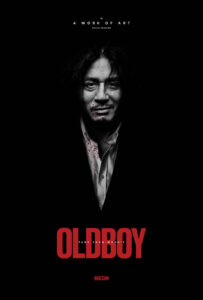 Oldboy, screenplay by Hwang Jo-yun, Lim Chun-hyeong, Lim Joon-hyung, and Park Chan-wook, based on the manga by Tsuchiya Garon – Korean cinema is doing very well right now, outproducing even the once strong Hong Kong industry by miles. One of Korea’s hottest directors, Chan-Wook Park, worked with Jo-un Hwang and Cheon-Hyeong Kim to adapt Garon Tsuchiya’s OldBoy manga into the second movie of Park’s Vengeance trilogy. While the story is second to the lesser-hyped first movie of the series, SYMPATHY FOR MR. VENGEANCE, the stylistic approach to this tale telling the choice between vengeance and justice along with the consequences gives OLDBOY a slight edge. Innovative, daring and unexpected, OLDBOY is one of the 21st centuries’ first masterpieces. –tg Oldboy, screenplay by Hwang Jo-yun, Lim Chun-hyeong, Lim Joon-hyung, and Park Chan-wook, based on the manga by Tsuchiya Garon – Korean cinema is doing very well right now, outproducing even the once strong Hong Kong industry by miles. One of Korea’s hottest directors, Chan-Wook Park, worked with Jo-un Hwang and Cheon-Hyeong Kim to adapt Garon Tsuchiya’s OldBoy manga into the second movie of Park’s Vengeance trilogy. While the story is second to the lesser-hyped first movie of the series, SYMPATHY FOR MR. VENGEANCE, the stylistic approach to this tale telling the choice between vengeance and justice along with the consequences gives OLDBOY a slight edge. Innovative, daring and unexpected, OLDBOY is one of the 21st centuries’ first masterpieces. –tg |
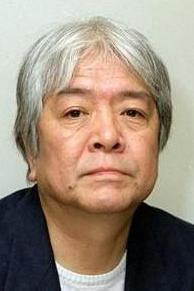 Tony Takitani, screenplay by Jun Ichikawa, based on the story by Haruki Murakami – To understand how ingenious and complicated screen adaptations can be, read Haruki Murakami’s “Tony Takitani” online. The original fourteen page short story is very straightforward, simple and appealing. What director Jun Ichikawa has done to it, however, is to add a style and sensitivity that even one of the world’s best writers did not capture. Had TONY TAKITANI been an original story we probably would still be complimenting Ichikawa on his imaginative talents. To see how he has transformed his source material is to understand his talent from a different perspective. –bk Tony Takitani, screenplay by Jun Ichikawa, based on the story by Haruki Murakami – To understand how ingenious and complicated screen adaptations can be, read Haruki Murakami’s “Tony Takitani” online. The original fourteen page short story is very straightforward, simple and appealing. What director Jun Ichikawa has done to it, however, is to add a style and sensitivity that even one of the world’s best writers did not capture. Had TONY TAKITANI been an original story we probably would still be complimenting Ichikawa on his imaginative talents. To see how he has transformed his source material is to understand his talent from a different perspective. –bk |
Best Visual Design |
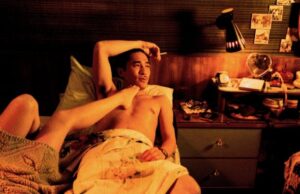  2046 – This is a gorgeous film. I want to decorate my apartment with stills from 2046. When the film started, I got distracted trying follow the subtitles and worried that I was going to have trouble keeping up with the storyline, but the stunning visual design drew me in and kept me watching. As with many of his other films, director Wong Kar Wai is assisted by veteran cinematographer Christopher Doyle and the two present a glorious display of visual images that are a marvel to watch. –ad 2046 – This is a gorgeous film. I want to decorate my apartment with stills from 2046. When the film started, I got distracted trying follow the subtitles and worried that I was going to have trouble keeping up with the storyline, but the stunning visual design drew me in and kept me watching. As with many of his other films, director Wong Kar Wai is assisted by veteran cinematographer Christopher Doyle and the two present a glorious display of visual images that are a marvel to watch. –ad |
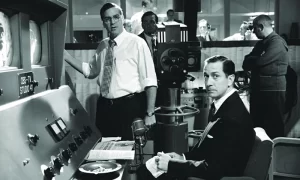 Good Night and Good Luck – With a relatively low budget, George Clooney’s take on Edward R. Murrow and his role in the McCarthy hearings painstakingly recreates the distinct, vintage look (and the breakneck, chaotic pace) of an early 1950s television newsroom. However, rather than casting an actor to play McCarthy, Clooney incorporates actual footage of the man himself. Along with the inclusion of humorously-dated period commercials, the film has the feel of a documentary newsreel, although Robert Elswit’s striking black-and-white cinematography and commenting intrusions from jazz vocalist Dianne Reeves provide a heavily stylized contrast. Fortunately, the combination successfully transports audiences back to a specific time and place, but also allows for some critical hindsight. –ck Good Night and Good Luck – With a relatively low budget, George Clooney’s take on Edward R. Murrow and his role in the McCarthy hearings painstakingly recreates the distinct, vintage look (and the breakneck, chaotic pace) of an early 1950s television newsroom. However, rather than casting an actor to play McCarthy, Clooney incorporates actual footage of the man himself. Along with the inclusion of humorously-dated period commercials, the film has the feel of a documentary newsreel, although Robert Elswit’s striking black-and-white cinematography and commenting intrusions from jazz vocalist Dianne Reeves provide a heavily stylized contrast. Fortunately, the combination successfully transports audiences back to a specific time and place, but also allows for some critical hindsight. –ck |
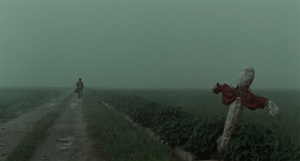 Memories of Murder – From the opening scenes where a body is found in a rural roadside ditch MEMORIES OF MURDER takes on it a unique visual style. The cinematographer’s palette is filled with colors that are slightly off the norm, a perfect match for a story of serial killings that is as humorous as it is tragic. At times claustrophobic, at times ominous, this film has various moods which are mostly image driven. –bk Memories of Murder – From the opening scenes where a body is found in a rural roadside ditch MEMORIES OF MURDER takes on it a unique visual style. The cinematographer’s palette is filled with colors that are slightly off the norm, a perfect match for a story of serial killings that is as humorous as it is tragic. At times claustrophobic, at times ominous, this film has various moods which are mostly image driven. –bk |
 Tony Takitani – The beauty of Jun Ichikawa’s work on TONY TAKITANI is the seamlessness of its adaptation from the work of Haruki Murakami, and much of that stems from the visuals. The film is mostly narrated in a manner that invokes storytelling. While we listen to the gentle narrative, images flow past us in a gentle left-to-right pan signifying the passage of time through Tony’s largely uneventful life. When moments of great significance occur, the camera stops and allows those actions to take place, most significantly, the appearances of the two women in Tony’s life, lively and energetically hurrying up the stairs, slowly coming into view as she moves toward the camera.Cinematography and lighting are used to powerful effect, especially in scenes evoking strong emotion or memory. Art direction and costumes are vitally important to the story of Tony’s wife, and the whimsical-yet-ultiamtely tragic outcome of her obsession are highlighted through visuals beautifully. TONY TAKITANI is visual and aural poetry. –mrc Tony Takitani – The beauty of Jun Ichikawa’s work on TONY TAKITANI is the seamlessness of its adaptation from the work of Haruki Murakami, and much of that stems from the visuals. The film is mostly narrated in a manner that invokes storytelling. While we listen to the gentle narrative, images flow past us in a gentle left-to-right pan signifying the passage of time through Tony’s largely uneventful life. When moments of great significance occur, the camera stops and allows those actions to take place, most significantly, the appearances of the two women in Tony’s life, lively and energetically hurrying up the stairs, slowly coming into view as she moves toward the camera.Cinematography and lighting are used to powerful effect, especially in scenes evoking strong emotion or memory. Art direction and costumes are vitally important to the story of Tony’s wife, and the whimsical-yet-ultiamtely tragic outcome of her obsession are highlighted through visuals beautifully. TONY TAKITANI is visual and aural poetry. –mrc |
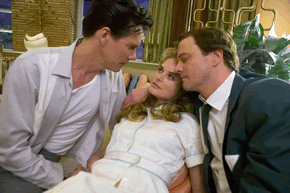 Where the Truth Lies – Atom Egoyan’s latest film WHERE THE TRUTH LIES is based on the clever, but by no means brilliant, mystery novel by Rupert Holmes. In many ways, the film appears to be a mere potboiler like the book, but as is frequently the case in Egoyan’s films, appearances can be deceiving. The main challenge of the film is to unravel the mystery through parallel narratives occurring fifteen years apart. In the early 1970’s, journalist Karen O’Connor tries to uncover the events of one fateful night in the late 1950’s by questioning the now estranged comedy team of Lanny Morris and Vince Collins. Rather than following the obvious choice to play up the colorfulness of the seventies, Egoyan instead shoots the “contemporary” scenes in a gritty, subdued, CHINATOWN style. In contrast, the fifties scenes (shot through a diffusion lens) appear to sparkle, shimmer, and take on a magical quality to underline an era when celebrities were truly placed some above all human rules of conduct and decency. The affects of age on the characters, too, are skillfully represented as Kevin Bacon and Colin Firth, as Morris and Collins, jump back and forth between mid-thirties to middle age. The costuming and makeup are subtle – Kevin Bacon even wore brown contact lenses to hide his trademark blue eyes – but the attention to detail is astounding. But the most remarkable scenes occur when Karen, played by Alison Lohman, appears as a ten-year-old girl… also played by twenty-five-year-old Lohman. With no digital trickery or distracting makeup – just a party dress, a high-angle shot, and a few well-placed steep stairs – we forget the reality and embrace the stunning deception. –sc Where the Truth Lies – Atom Egoyan’s latest film WHERE THE TRUTH LIES is based on the clever, but by no means brilliant, mystery novel by Rupert Holmes. In many ways, the film appears to be a mere potboiler like the book, but as is frequently the case in Egoyan’s films, appearances can be deceiving. The main challenge of the film is to unravel the mystery through parallel narratives occurring fifteen years apart. In the early 1970’s, journalist Karen O’Connor tries to uncover the events of one fateful night in the late 1950’s by questioning the now estranged comedy team of Lanny Morris and Vince Collins. Rather than following the obvious choice to play up the colorfulness of the seventies, Egoyan instead shoots the “contemporary” scenes in a gritty, subdued, CHINATOWN style. In contrast, the fifties scenes (shot through a diffusion lens) appear to sparkle, shimmer, and take on a magical quality to underline an era when celebrities were truly placed some above all human rules of conduct and decency. The affects of age on the characters, too, are skillfully represented as Kevin Bacon and Colin Firth, as Morris and Collins, jump back and forth between mid-thirties to middle age. The costuming and makeup are subtle – Kevin Bacon even wore brown contact lenses to hide his trademark blue eyes – but the attention to detail is astounding. But the most remarkable scenes occur when Karen, played by Alison Lohman, appears as a ten-year-old girl… also played by twenty-five-year-old Lohman. With no digital trickery or distracting makeup – just a party dress, a high-angle shot, and a few well-placed steep stairs – we forget the reality and embrace the stunning deception. –sc |
Best Ensemble Cast |
 Me and You and Everyone We Know Me and You and Everyone We Know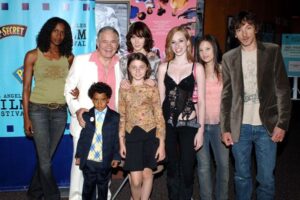 – As the title implies, ME AND YOU AND EVERYONE WE KNOW is truly an ensemble piece, which resonates not just because of Miranda July’s top-notch screenplay and direction but because of the stellar performance of the entire cast, from those with more central roles, including Miranda July, John Hawkes, Miles Thompson, and Brandon Ratcliff (nominated separately for Best Supporting Actor) to those portraying more peripheral – but no less important – characters, including Carlie Westerman, Najarra Townsend, Natasha Slayton, Jonell Kennedy, Hector Elias, Tracy Wright, and Brad Henke. –ad – As the title implies, ME AND YOU AND EVERYONE WE KNOW is truly an ensemble piece, which resonates not just because of Miranda July’s top-notch screenplay and direction but because of the stellar performance of the entire cast, from those with more central roles, including Miranda July, John Hawkes, Miles Thompson, and Brandon Ratcliff (nominated separately for Best Supporting Actor) to those portraying more peripheral – but no less important – characters, including Carlie Westerman, Najarra Townsend, Natasha Slayton, Jonell Kennedy, Hector Elias, Tracy Wright, and Brad Henke. –ad |
The Best of Youth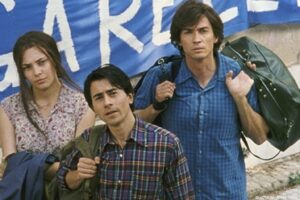 – This sprawling story lasts six hours, covers four decades and has a huge cast. Essentially the story of two brothers who are close as teenagers but travel very different roads into adulthood, it also manages to chronicle the lives of their friends, siblings, parents and the women they love. While Alessio Boni (Matteo) and Luigi Lo Cascio (Nicola) as the two brothers turn in star performances that are absolute perfection, the supporting cast is also superb – not a weak performance in the entire group. Many characters have screen time that would make them eligible for lead actor in a shorter film. –bk – This sprawling story lasts six hours, covers four decades and has a huge cast. Essentially the story of two brothers who are close as teenagers but travel very different roads into adulthood, it also manages to chronicle the lives of their friends, siblings, parents and the women they love. While Alessio Boni (Matteo) and Luigi Lo Cascio (Nicola) as the two brothers turn in star performances that are absolute perfection, the supporting cast is also superb – not a weak performance in the entire group. Many characters have screen time that would make them eligible for lead actor in a shorter film. –bk |
Happy Endings – Reminiscent of Robert Altman’s SHORT CUTS, the latest film by Don Roos (THE OPPOSITE OF SEX) chronicles the multilayered, sometimes loosely-connected stories of a cast of characters in LA, whose discontent and dysfunction – and humanity – stem from the fact that they are all hiding something about their lives or their pasts. The film works because of the fine, often unexpected performances by the ensemble case, which includes Lisa Kudrow as clinic-worker Mamie; Steve Coogan as her stepbrother Charley; Bobby Cannavale (‘Vince’ from “Will & Grace”) as her massage therapist/boyfriend; Jesse Bradford as the aspiring documentary filmmaker who is blackmailing her; Jason Ritter as closeted musician Otis; Tom Arnold as Otis’ widowed father; and Maggie Gyllenhaal as singer Jude, who becomes involved with both of them. The fact that we are able to believe that Gyllenhaal could fall for Arnold is an accomplishment in itself. –ad – Reminiscent of Robert Altman’s SHORT CUTS, the latest film by Don Roos (THE OPPOSITE OF SEX) chronicles the multilayered, sometimes loosely-connected stories of a cast of characters in LA, whose discontent and dysfunction – and humanity – stem from the fact that they are all hiding something about their lives or their pasts. The film works because of the fine, often unexpected performances by the ensemble case, which includes Lisa Kudrow as clinic-worker Mamie; Steve Coogan as her stepbrother Charley; Bobby Cannavale (‘Vince’ from “Will & Grace”) as her massage therapist/boyfriend; Jesse Bradford as the aspiring documentary filmmaker who is blackmailing her; Jason Ritter as closeted musician Otis; Tom Arnold as Otis’ widowed father; and Maggie Gyllenhaal as singer Jude, who becomes involved with both of them. The fact that we are able to believe that Gyllenhaal could fall for Arnold is an accomplishment in itself. –ad |
Nobody Knows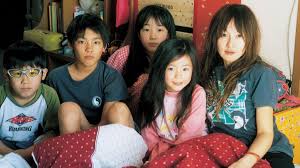 – Although Hirokazu Koreeda’s powerful film appears only in the Ensemble cast category, surely the director deserves much of the credit for getting it here. Koreeda takes a cast of four child actors playing a family abandoned by their mother and presents such heartbreaking reality that avoids slipping into melodrama and deftly balances their tragedy with the exuberance of childhood. When this film debuted at Cannes in 2004, fourteen-year-old Yuya Yagira won the Best Actor award at Cannes for his powerful performance as oldest brother Akira. Add to the mix Japanese actress You as the strangely childlike mother who leaves her children and you’ve got a spellbinding cast that delivers a powerful message without preaching. –mrc – Although Hirokazu Koreeda’s powerful film appears only in the Ensemble cast category, surely the director deserves much of the credit for getting it here. Koreeda takes a cast of four child actors playing a family abandoned by their mother and presents such heartbreaking reality that avoids slipping into melodrama and deftly balances their tragedy with the exuberance of childhood. When this film debuted at Cannes in 2004, fourteen-year-old Yuya Yagira won the Best Actor award at Cannes for his powerful performance as oldest brother Akira. Add to the mix Japanese actress You as the strangely childlike mother who leaves her children and you’ve got a spellbinding cast that delivers a powerful message without preaching. –mrc |
The Squid and the Whale – One of the greatest challenges in casting is to build a family unit from unrelated actors. The four lead actors in this film — Jeff Daniels, Laura Linney, Jesse Eisenberg, and Owen Kline – convincingly portray a family and the crisis that they are experiencing through divorce. Family dynamics are explored and loyalties are tested throughout the film, but all you need to know about The Berkmans is shown at the beginning of the film through their game of doubles tennis. – One of the greatest challenges in casting is to build a family unit from unrelated actors. The four lead actors in this film — Jeff Daniels, Laura Linney, Jesse Eisenberg, and Owen Kline – convincingly portray a family and the crisis that they are experiencing through divorce. Family dynamics are explored and loyalties are tested throughout the film, but all you need to know about The Berkmans is shown at the beginning of the film through their game of doubles tennis. |
Wilby Wonderful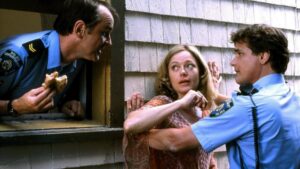 – It is a testament to director Daniel MacIvor’s skill that he brings together such a phenomenal cadre of actors then largely gets out of their way and lets them do what comes naturally. Sandra Oh was also recognized with a Best Supporting Actress nod, but many others were in contention. Callum Keith Rennie, Rebecca Jenkins, Paul Gross, Jim Alodie, Maury Chaykin, last-year’s Breakout Award-winner, Ellen Page, even MacIvor himself come together to truly bring to life the quirks of a small, island community. If Wilby is wonderful, it’s largely thanks to this cast. –mrc – It is a testament to director Daniel MacIvor’s skill that he brings together such a phenomenal cadre of actors then largely gets out of their way and lets them do what comes naturally. Sandra Oh was also recognized with a Best Supporting Actress nod, but many others were in contention. Callum Keith Rennie, Rebecca Jenkins, Paul Gross, Jim Alodie, Maury Chaykin, last-year’s Breakout Award-winner, Ellen Page, even MacIvor himself come together to truly bring to life the quirks of a small, island community. If Wilby is wonderful, it’s largely thanks to this cast. –mrc |
Best Documentary |
It’s a Tie! |
 Born into Brothels 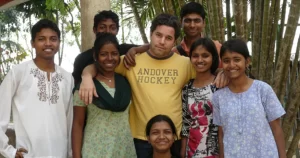 – BORN INTO BROTHELS is a documentary film, featuring Zana Briski, a photojournalist who developed photography classes for children growing up in Calcutta’s brothels. The film, made by Briski and her colleague, cinematographer, Ross Kauffman, has earned more than 25 independent film awards around the world, including 10 awards for best documentary, 11 audience awards, and a prestigious Nestor Almendros Prize for Courage in Filmmaking by Human Rights Watch (2004). The students chronicled by these filmmakers were an auspicious group of young artists, and one student in particular shocks audiences with his apparent creative genius. Briski and Kauffman detail the coursework and lives of these children in an objective and informative manner, without attempting to extract sympathy or emotion from the audience, so that their filmmaking transcends that of other documentaries featuring underprivileged youth born to sex workers in developing countries. –ec – BORN INTO BROTHELS is a documentary film, featuring Zana Briski, a photojournalist who developed photography classes for children growing up in Calcutta’s brothels. The film, made by Briski and her colleague, cinematographer, Ross Kauffman, has earned more than 25 independent film awards around the world, including 10 awards for best documentary, 11 audience awards, and a prestigious Nestor Almendros Prize for Courage in Filmmaking by Human Rights Watch (2004). The students chronicled by these filmmakers were an auspicious group of young artists, and one student in particular shocks audiences with his apparent creative genius. Briski and Kauffman detail the coursework and lives of these children in an objective and informative manner, without attempting to extract sympathy or emotion from the audience, so that their filmmaking transcends that of other documentaries featuring underprivileged youth born to sex workers in developing countries. –ec |
 Murderball  – The sport of wheelchair rugby, aka ‘Murderball’, is given eye-popping attention in this documentary that follows the journey of the US team to recapture its top spot in the world. The filmmakers take two well-worn story arcs, athletes sacrificing to win again and individuals with life-changing injuring struggling to remake their lives, and fuse them into a memorable and perception-changing film. –bc – The sport of wheelchair rugby, aka ‘Murderball’, is given eye-popping attention in this documentary that follows the journey of the US team to recapture its top spot in the world. The filmmakers take two well-worn story arcs, athletes sacrificing to win again and individuals with life-changing injuring struggling to remake their lives, and fuse them into a memorable and perception-changing film. –bc |
Double Dare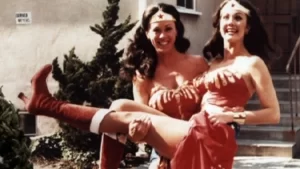 – Amanda Micheli directs this fascinating look at the lives and careers of two stuntwomen- Jeannie Epper (stuntwoman for Lynda Carter in the ‘Wonder Woman’ TV series) and Zoë Bell (stuntwoman for Lucy Lawless in the ‘Xena: Warrior Princess’ TV series). This documentary succeeds by not taking a heavy-handed approach for presenting ‘the truth’ about stuntwomen; rather, it allows the two women to be themselves and lets their personalities and accomplishments shine through organically. Certainly, there is an interesting viewpoint of the women trying to create and continue a career in a largely male-dominated industry, but the documentary has a very natural feel by just presenting the lives of these two extraordinary women. No other ‘story’ is needed- this is captivating viewing on its own merit. –clk – Amanda Micheli directs this fascinating look at the lives and careers of two stuntwomen- Jeannie Epper (stuntwoman for Lynda Carter in the ‘Wonder Woman’ TV series) and Zoë Bell (stuntwoman for Lucy Lawless in the ‘Xena: Warrior Princess’ TV series). This documentary succeeds by not taking a heavy-handed approach for presenting ‘the truth’ about stuntwomen; rather, it allows the two women to be themselves and lets their personalities and accomplishments shine through organically. Certainly, there is an interesting viewpoint of the women trying to create and continue a career in a largely male-dominated industry, but the documentary has a very natural feel by just presenting the lives of these two extraordinary women. No other ‘story’ is needed- this is captivating viewing on its own merit. –clk |
Grizzly Man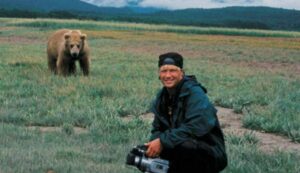 – While GRIZZLY MAN is deservingly in the Best Documentary category, one could also make a good argument for Best Movie as well. Veteran director Warner Herzog (not to be confused with baseball great Whitey Herzog) takes footage of nutjob bear lover Timothy Treadwell and intersperses it with interviews with his friends and crafts a powerful film that looks into the insatiable need for Timothy Treadwell to be near what he loves and its final cost. –tg – While GRIZZLY MAN is deservingly in the Best Documentary category, one could also make a good argument for Best Movie as well. Veteran director Warner Herzog (not to be confused with baseball great Whitey Herzog) takes footage of nutjob bear lover Timothy Treadwell and intersperses it with interviews with his friends and crafts a powerful film that looks into the insatiable need for Timothy Treadwell to be near what he loves and its final cost. –tg |
In the Realms of the Unreal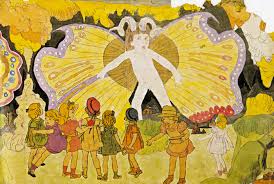 – Legendary outsider artist Henry Darger’s fascinating scroll paintings are displayed in museums around the world and many are familiar with the story of his solitary life as a school janitor. The mere facts of his life – scrubbing floors, trash picking, near-obsessive church attendance – could inspire pity and grief, especially since no one knew of his incredibly abundant artwork and writing until after his death. But IN THE REALMS OF THE UNREAL, Jessica Yu’s documentary of Darger’s life and work, inspires quite different emotions. Conceived as a study of Darger’s other existence – the one he lived at night in his mind, full of imaginary girl heroines and dramatic wars between the forces of good and evil – the film celebrates the healing force of human imagination. The stunning animation literally brings life to Darger’s art and the bold choice not to include any scholarly commentary allows audiences to connect personally and passionately with the man’s dazzling dreams. Films about art frequently speak to the mind or touch the heart. This one nourishes the soul. –sc – Legendary outsider artist Henry Darger’s fascinating scroll paintings are displayed in museums around the world and many are familiar with the story of his solitary life as a school janitor. The mere facts of his life – scrubbing floors, trash picking, near-obsessive church attendance – could inspire pity and grief, especially since no one knew of his incredibly abundant artwork and writing until after his death. But IN THE REALMS OF THE UNREAL, Jessica Yu’s documentary of Darger’s life and work, inspires quite different emotions. Conceived as a study of Darger’s other existence – the one he lived at night in his mind, full of imaginary girl heroines and dramatic wars between the forces of good and evil – the film celebrates the healing force of human imagination. The stunning animation literally brings life to Darger’s art and the bold choice not to include any scholarly commentary allows audiences to connect personally and passionately with the man’s dazzling dreams. Films about art frequently speak to the mind or touch the heart. This one nourishes the soul. –sc |
Best Short Film |
Chlotrudis Award! |
  Jellybaby by Ronan and Rob Burke (Ireland – 10 minutes) – Jack and Jill had a great relationship. Then they had a baby.Ronan and Rob Burke both graduated from the Dublin Institute of technology’s prestigious Film Department, which has fostered many of Ireland’s premier film talents. Jellybaby is there first outing as co-directors. Jellybaby by Ronan and Rob Burke (Ireland – 10 minutes) – Jack and Jill had a great relationship. Then they had a baby.Ronan and Rob Burke both graduated from the Dublin Institute of technology’s prestigious Film Department, which has fostered many of Ireland’s premier film talents. Jellybaby is there first outing as co-directors. |
Audience Award & Chlotrudis Award Runner-Up! |
  Darling Darling by Matthew Lessner (USA – 13 minutes) – Timid, nervous and unassuming, Harold is faced with the daunting task of picking up his date for the high school dance. Nothing is as expected upon arriving at the Darling household, and Harold must do his best to make a good first impression on the one-of-a-kind Mr. Darling against odd and unforeseen circumstances.Matthew Lessner grew up in the small Pacific NorthWest town of Roseburg, Oregon. This rural community provided the ideal training ground for a young filmmaker with an eye of the unusual. Matthew produced films on various topics throughout junior high and high school,and went on to attend Chapman University film school in Orange, California. In March 2005, Matthew set out to produce his most ambitious project to date, Darling Darling, starring Michael Cera of “Arrested Development.” Darling Darling by Matthew Lessner (USA – 13 minutes) – Timid, nervous and unassuming, Harold is faced with the daunting task of picking up his date for the high school dance. Nothing is as expected upon arriving at the Darling household, and Harold must do his best to make a good first impression on the one-of-a-kind Mr. Darling against odd and unforeseen circumstances.Matthew Lessner grew up in the small Pacific NorthWest town of Roseburg, Oregon. This rural community provided the ideal training ground for a young filmmaker with an eye of the unusual. Matthew produced films on various topics throughout junior high and high school,and went on to attend Chapman University film school in Orange, California. In March 2005, Matthew set out to produce his most ambitious project to date, Darling Darling, starring Michael Cera of “Arrested Development.” |
Audience Award Runner-Up! |
Tahara by Sara Ann Rashad (USA – 18 minutes) – Amina must decide if she will submit to family pressure to circumcise her daughteror abandon this tradition because of pressure she recieves from her mother whenher husband’s away on a business trip. Will Amina find the courage to save her daughter by Sara Ann Rashad (USA – 18 minutes) – Amina must decide if she will submit to family pressure to circumcise her daughteror abandon this tradition because of pressure she recieves from her mother whenher husband’s away on a business trip. Will Amina find the courage to save her daughter  from the horrors of female genital mutilation? from the horrors of female genital mutilation?
Sara Rashad is the writer/producer/director of Tahara which recieved five grants in pre-production for the script. Tahara is touring in festivals worldwideand has recieved over 10 awards to date. Sara recieved a BFA in Acting. Tahara is her USC thesis film produced at the University of SouthernCalifornia and her directorial debut. |
 Disposition by Peter Bertoli (USA – 4 minutes) – In a set of images resembling a waking dream sequence, Disposition explores the fractured images that a mind might envision. The technological-like animation qualities are juxtaposed to the more cerebral visual images. Their connection is similar to the those that our mind might make given the setting of a person’s mood or temperament. The film’s title Disposition is a way to indicate this final act of deposing. Disposition by Peter Bertoli (USA – 4 minutes) – In a set of images resembling a waking dream sequence, Disposition explores the fractured images that a mind might envision. The technological-like animation qualities are juxtaposed to the more cerebral visual images. Their connection is similar to the those that our mind might make given the setting of a person’s mood or temperament. The film’s title Disposition is a way to indicate this final act of deposing.
Peter Bertoli is a 14-year-old freshman at Oyster Bay (NY) High School. He has been interested in films and filmmaking for over two years. His future plans are to continue to explore the film making process and to possibly attend film school after high school. |
| Expats by Ethan Mayer Smith (USA – 13 minutes) – Set in the late nineteen-sixties, Expats comprises an experimental series of film montages set to original music inspired by the zeitgeist. The narrative focuses on an affluent, existential youth who finds solace in the various romances he nurtures on either side of the Atlantic. Utilizing both Super-8mm and 16mm film to recreate candid and homemade imagery from yesteryear, writer/director Ethan Mayer Smith and cinematographer James Silverman paint a portrait of a reckless lover whose heart oscillates between genuine feeling and callous indifference.
Ethan Mayer Smith is currently in development on his feature debut as writer/director entitled, Quo Vadis, Sean? He resides in New York City. Ethan’s previous works have been exhibited nationally at independent film festivals including the New England Film/Video Festival, the Boston UndergroundFilm Festival, the Smogdance Festival, and the San Francisco Short Film Festival. Acclaim and awards for these productions were received for directing, editing, sound design, and cinematography. Ethan received his undergraduate degree in film production from Boston University. |
| Handshake by Patrick Smith (USA – 5 minutes) – In this animated film, an innocent greeting between two people is quickly transformed into a sticky, tangled struggle for survival.Self taught animator Patrick Smith made his directorial debut in the Emmy nominated MTV animated series “Down-town.” He went on to direct several seasons of the popular series “Daria.” Currently, Smith is working full time on independent films. His films have been featured on MTV, several Spike and Mikes collections, Avoid Eye Contact (The best of NYC), and over a hundred international film festivals. Today, the 33-year-old animator is writing his first feature, and animating his next independent short. |
| Landslag by Kyja Kristjana Kristjansson-Nelson (Iceland – 4 minutes) – The filmmaker returns to the fjord from which her great-grandparents emigrated. Landslag, simply meaning ‘landscape’ in Icelandic, explores the gesture of natural force, memory and nostalgia that physically and metaphysically shape the Skagafjodur region of Iceland.
Kyja Kristjansson-Nelson is currently living in Iceland, working on a film project as a Fulbright Fellow.She recently completed her MFA in Film at the University of Wisconsin Milwaukee, where she also taught film and video production. |
| My Scarlet Letter by Karen Dee Carpenter (USA – 10 minutes) – Marked as outsiders, Emily and her friends are searching for a quick escape from their small town on this Friday night. They long to break free from the claustrophobic confines of their rural existence. The closed-minded oppression that pervades their community is disguised by the idyllic landscape that surrounds it. A backwoods boy and his car finally provide a way out but as the night wears on Emily realizes that no matter where she goes, she will always be from here.
Karen Dee Carpenter attended Tyler School of Art and graduated with a B.F.A degree in Painting. Her artwork has been exhibited internationally and she has been the recipient of numerous awards including a Partners of the Americas Travel Grant for travel and exhibition of her paintings in Brazil. She has produced four short films for which she has received a Pennsylvania Council on the Arts Fellowship inboth Filmmaking and Screenwriting. She has just been awarded a 2005 PrincessGrace Award in support of her thesis film, Sarah & Deeand is currently completing her M.F.A degree in Film at Temple University. |
| Thug by Geva Patz (USA – 2 minutes) – A woman runs for her life from a menacing pursuer. Will anybody save her?
Geva Patz is a Boston-based filmmaker. His previous short film, “Cog” won the New England Emerging Filmmaker Award at the 2003 Woods Hole Film Festival. |
| Tom-cat by Gary Miller (United Kingdom – 10 minutes) – Tom-cat is a comedy focusing on our hero Tom’s begrudging acceptance of his owner s new boyfriend.
Gary Miller picked up 3 awards for his first short The Invisible Shelly in 2000 in Los Angeles and in the UK. Tom-cat is his 2nd short and he is continuing to write feature scripts with an aim to directing them next year. |
